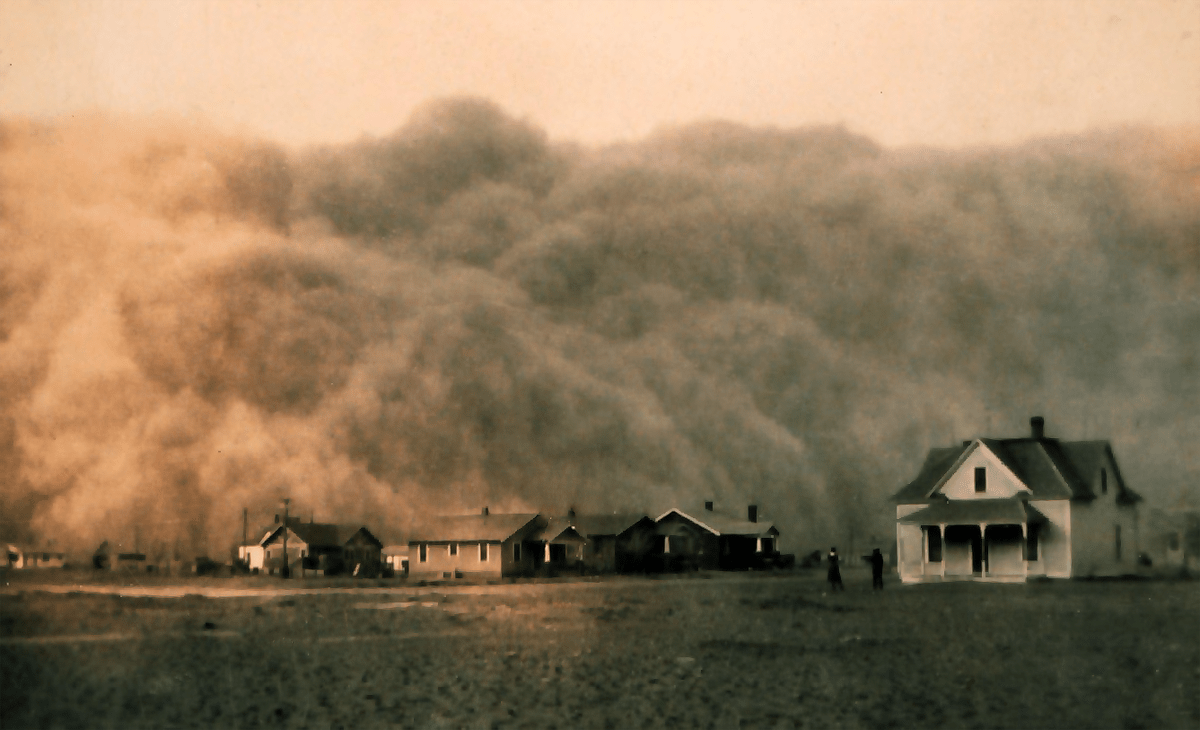As Roosevelt Acted To Stop Farm Foreclosures, So Must Government Help Distressed Americans Today

I’ve been reading The Coming of the New Deal by Arthur M. Schlesinger, Jr. This book, published in 1959, was the second of three titles in Professor Schlesinger’s The Age of Roosevelt series.
Described in the book is Franklin Roosevelt’s response in the first weeks of his administration to problem of farm foreclosures. I’m less interested on the specifics of the program—I know little of farms or banking—than I am in the fact that the actions detailed here took place at all. These are things that took place within the first weeks and months of the Roosevelt administration in 1933.
( Above is a picture of a dust storm in the Depression-era Dust Bowl farm crisis. The farm is in Stratford, Texas. The photo is from 1935. Here is some history of the Dust Bowl and of farming in the 1930’s)
From The Coming of the New Deal—
“The mortgage question was causing more immediate unrest than anything else;, and the administration had already moves with vigor to relive the situation. At the end of March, Roosevelt reorganized the hodgepodge of federal agricultural credit instrumentalities into a single new agency, the Farm Credit Administration….It’s powers confirmed by the Emergency Farm Mortgage Act and supplanted in June by the Farm Credit Act, FCA refinanced farm mortgages, developed techniques for persuading creditors to make reasonable settlements, set up local farm debt adjustment committee, and eventually established a system of regional banks to make mortgage, production, and marketing loans and to provide credits to cooperatives. It loaned more than $100 million in its first seven months–nearly four times as much as the total of mortgage loans to farmers from the entire land-bank system the year before. At the same time, it beat down the interest rate in all areas of farm credit…Though anger still rumbled in the farm belt, FCA gave every evidence of getting at least the emergency debt problem out of the way.”
The response to the problem of farm foreclosures reported In New Deal are such a contrast to the go it alone ethic of recent years. It reminds us that government has a role to play in our economy and in our society.
In the days ahead, as we recover from the current financial crisis, let’s recall that government action has served us well before and is needed again to take us back to prosperity.
Hopefully, larger Democratic majorities in the House and Senate, and a new Democratic President, will lead the way. Hopefully, our newly elected political leadership will have the courage and imagination to try new ideas and ask the American people to see that we are all connected in this life.
Here is some very good history of the New Deal.
Here is a history of New Deal agricultural programs.
President Roosevelt’s first Secretary of Agriculture, and future Vice President, Henry Wallace, was an interesting figure. American Dreamer–The Life And Times Of Henry A. Wallace by former Iowa Senator John Culver and John Hyde is a good book on Wallace and Depression era agricultural programs.
( Below is an Iowa farm foreclosure sale from the 1930’s)

